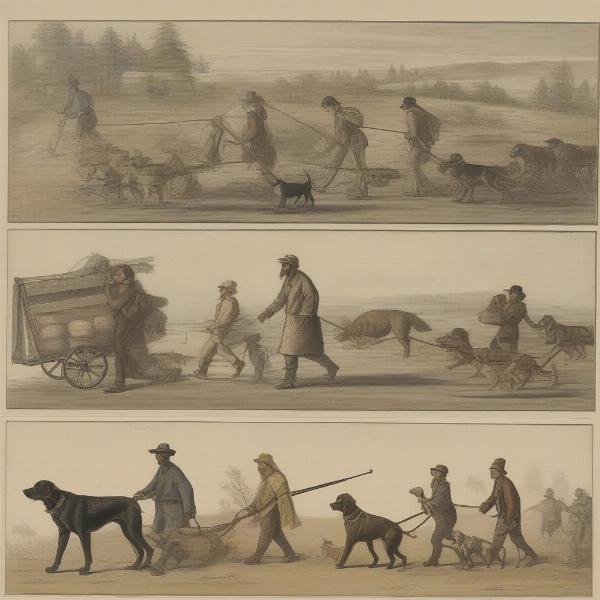The question “is a porter a type of dog?” often arises due to the common association of the word “porter” with carrying or transporting. While “porter” isn’t a recognized dog breed, the term can be connected to the canine world in a few fascinating ways. This article will explore these connections, delving into the history of working dogs, and examining breeds that might be considered “porters” in a broader sense.
Exploring the “Porter” Connection in the Canine World
While there’s no official “Porter” dog breed, the concept of a dog carrying or transporting objects has historical roots. Think of dogs pulling carts, carrying messages, or even assisting hunters with retrieving game. These roles demonstrate the canine capacity for “porting,” even if it’s not a formal breed designation. This historical context helps us understand why someone might ask, “is a porter a type of dog?”
 Historical Dogs Carrying Goods
Historical Dogs Carrying Goods
Breeds Known for Carrying and Transporting
Several dog breeds excel at carrying and transporting, echoing the “porter” idea. Bernese Mountain Dogs, for instance, were originally bred to pull carts in the Swiss Alps. Similarly, Newfoundland dogs are renowned for their strength and water rescue abilities, essentially “porting” people to safety. Even smaller breeds like Corgis historically herded livestock, a form of “porting” animals from one place to another.
Modern “Porters”: Service and Assistance Dogs
Today, the “porter” concept continues in service and assistance dogs. These highly trained canines carry essential items for their handlers, from medication to groceries. They “port” not just physical objects, but also independence and a sense of security. These modern “porters” showcase the incredible bond between humans and dogs.
Beyond the Physical: Dogs as Emotional “Porters”
Beyond carrying physical objects, dogs often act as emotional “porters” for their owners. They offer companionship, reduce stress, and provide unconditional love. This emotional support is a significant aspect of the human-animal bond, illustrating a different kind of “porting”—the carrying of emotional burdens and the sharing of joy.
Conclusion
While “porter” isn’t a specific dog breed, the concept resonates with the historical and ongoing roles dogs play in carrying and transporting. From Bernese Mountain Dogs pulling carts to service dogs assisting their handlers, canines have demonstrated their “porter” abilities in various ways. Moreover, their emotional support adds another dimension to this concept, highlighting the profound bond between humans and their canine companions. So, while the answer to “is a porter a type of dog?” is technically no, the spirit of the question highlights the diverse ways dogs “carry” and support us.
FAQ
- Is there a dog breed actually called a “Porter”? No, “Porter” is not a recognized dog breed.
- What breeds are known for carrying things? Breeds like Bernese Mountain Dogs, Newfoundlands, and even Corgis historically carried or transported things.
- How do service dogs act as “porters”? Service dogs carry essential items for their handlers and provide emotional support.
- What is the historical connection between dogs and “porting”? Historically, dogs were used to pull carts, carry messages, and assist hunters, demonstrating their carrying capacity.
- What does the term “porting” mean in relation to dogs? In this context, “porting” refers to carrying or transporting, whether physical objects or emotional burdens.
Related Articles on ILM Dog
About ILM Dog
ILM Dog (ILM Dog) is your trusted global resource for expert dog care advice, offering practical tips on everything from breed selection and training to health, nutrition, and grooming. We’re committed to empowering dog owners worldwide with the knowledge and resources they need to provide the best possible care for their canine companions. We specialize in dog breed information, health and wellness, and training tips. Whether you’re a new dog owner or a seasoned expert, ILM Dog provides valuable insights and expert guidance to help you navigate the joys and challenges of dog ownership. Contact us today at [email protected] or +44 20-3965-8624 for personalized support.